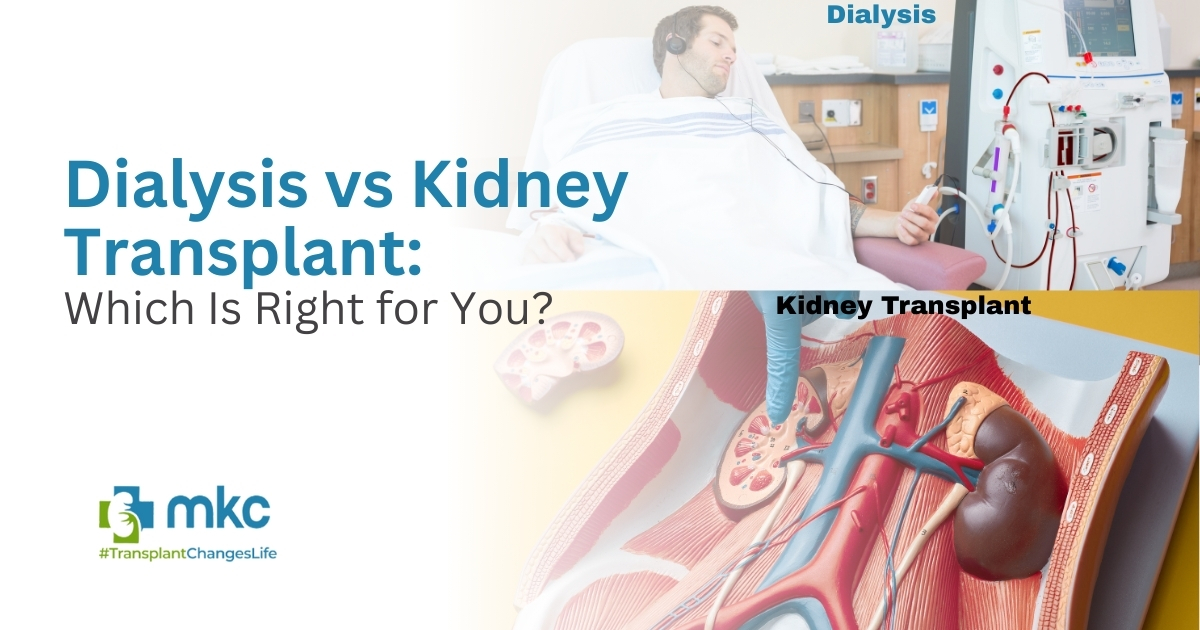Chronic kidney disease (CKD) is a growing health concern that can progress to end-stage renal disease (ESRD), where kidneys can no longer function properly. At this stage, patients need dialysis or a kidney transplant to survive. Choosing the right treatment depends on your health, lifestyle, and long-term goals. At Madhuban Kidney Care, our team provides expert guidance and advanced solutions to help you make an informed choice.
Understanding Dialysis
Dialysis is a procedure that performs the kidneys’ function by removing waste and excess fluids from the blood. There are two main types:
1. Hemodialysis
Blood is filtered outside the body using a machine.
Usually performed 3 times a week, 3–5 hours per session.
Requires vascular access through a fistula, graft, or catheter.
2. Peritoneal Dialysis
Uses the lining of the abdomen (peritoneum) as a natural filter.
Can be done at home, either multiple times a day or overnight.
Benefits of Dialysis:
Life-saving for ESRD patients.
Can be initiated quickly.
Does not require major surgery.
Considerations:
Frequent sessions and lifestyle adjustments.
Risk of infections and long-term complications.
Dietary and fluid restrictions are necessary.
Understanding Kidney Transplant
A kidney transplant involves replacing a failed kidney with a healthy one from a living or deceased donor. The new kidney restores normal kidney function, improving overall health and quality of life.
Benefits of Kidney Transplant:
Better quality of life than long-term dialysis.
Fewer dietary and fluid restrictions.
Improved energy levels and overall health.
Considerations:
Requires major surgery.
Lifelong immunosuppressants are necessary to prevent rejection.
Surgical risks and post-transplant monitoring are required.
Dialysis vs Kidney Transplant: Key Differences
| Feature | Dialysis | Kidney Transplant |
|---|---|---|
| Procedure | Blood filtration via machine | Surgical placement of donor kidney |
| Frequency | Multiple times per week | One-time surgery, with ongoing follow-up |
| Lifestyle | Restrictions on diet, fluids, and activities | More freedom and improved energy |
| Survival & Health | Supports life | Better long-term survival and quality of life |
| Risks | Infection, access complications | Surgical risks, rejection, medication side effects |
Who Should Consider Each Option?
Dialysis: Suitable for patients waiting for a donor, not eligible for surgery, or with health conditions that increase surgical risk.
Kidney Transplant: Best for patients healthy enough for surgery, with a compatible donor, and able to manage lifelong medications.
How Madhuban Kidney Care Can Help
At Madhuban Kidney Care, we provide personalized kidney care with a focus on your health, comfort, and long-term well-being. Our services include:
Comprehensive evaluation for dialysis and transplant suitability
Advanced dialysis facilities and support
Expertise in kidney transplant procedures
Post-treatment care, dietary guidance, and lifestyle counseling
Conclusion
Deciding between dialysis and a kidney transplant is a critical choice in managing kidney failure. While dialysis sustains life, a kidney transplant can significantly improve quality of life and long-term health. Madhuban Kidney Care ensures expert guidance, advanced treatment options, and compassionate care to help you make the best decision for your kidneys.
Contact Madhuban Kidney Care today to schedule a consultation and take the first step toward better kidney health.
📞 Phone: +91 782 789 0989
🏥 Location: ED 3A, Madhuban Chowk, Pitampura, New Delhi, 110034


